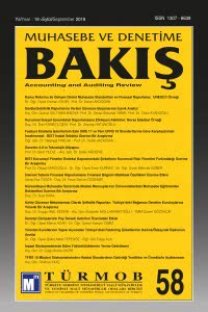SOSYAL RAPORLAMA ANLAYIŞININ MUHASEBE MESLEK MENSUPLARI TARAFINDAN ALGILANMASI ÜZERİNE AMPİRİK BİR ÇALIŞMA
Sosyal muhasebe, sosyal raporlama, muhasebe meslek mensupları
___
- Adams, Carol A., Wan-Ying Hill, Roberts Clare B., (1998), “Corporate Social Reporting Practices in Western Europe: Legitimating Corporate Behaviour?” British Accounting Review, Vol.30, pp.1-21
- Aydemir, Muzaffer, (1999), “Sosyal Sorumluk 8000 (Social Accountability 8000) Standardı” Dokuz Eylül Üniversitesi Sosyal Bilimler Enstitüsü Dergisi, Cilt 1, Sayı: 3, ss.1-11.
- Bebbington, Jan, Gray, Rob, Thomson Ian, Walters Diane (1994), “Accounting Attitudes and EnvironmentallySensitive Accounting”, Accounting and Business Research, Vol.24, Nr. 94, pp.109-120
- Estes, Ralph, (1976), “Standards for Corporate Social Reporting”, Management Accounting, Vol.58, No. 5, pp. 19-23
- Gamble, G., Hsu, K., Jackson C, Tollerson C.(1996), “Environmental Disclosures in Annual Reports : An International Perspective”, The International Journal Of Accounting, Vol.31, No. 3, pp.293-331.
- Gond, Jean-Pascal, Herrbach Oliver (2006), “Social Reporting As an Organizational Learning Tool? A Theoretical Framework”, Journal of Business Ethics, Vol. 65, pp.359-371
- Gray, Rob, Owen, Dave, Adams, Carol, (1996), Accounting and Accountability: Changes and Challenges in Corporate Social and Environmental Reporting, Prentice Hall, London
- Gray, Rob, Owen, David, Maunders Keith, (1986), “Corporate Social Reporting: The Way Forward”, Accountancy, pp.108-109
- Harte G., Owen D. (1991), “Environmental Disclosures In Annual Reports of British Companies: A Research Note”, Accounting, Auditing and Accountability Journal, Vol.4, No.3, pp.51-61
- Hurley, J.F. (1982), Social Responsibility Accounting for Business, Doctoral Dissertation, University of Nebraska- Lincoln Imam, Shaded, (2000), “Corporate Social Performance Reporting In Bangladesh”, Managerial Auditing Journal, Vol.15, No.3, pp.133–141
- Kırlıoğlu, Hilmi, Can, Ahmet Vecdi, (2001), Muhasebe Meslek Mensuplarının Çevre Muhasebesi Anlayışı Üzerine Bir Araştırma”, Muhasebe ve Finansman Dergisi, Sayı: 10, ss. 60–68
- Lodhia, Sumit K,(2003), “Accountants’ Responses to the Environmental Agenda in Developing Nation: An Initial and Exploratory Study on Fiji”, Critical Perspectives On Accounting, Vol.14, pp.715–737
- Owen, David, Swift Tracey, (2001), “Introduction Social Accounting, Reporting and Auditing: Beyond The Rhetoric?” Business Ethics: A European Review, Vol.10, No.1, pp.4-8
- Özgüç, Erkan, (2005), Kurumsal Sosyal Sorumluluk, Sermaye Piyasası Kurulu Yeterlik Etüdü, Ankara
- Philip, Radhika (2003), “Corporate Social Reporting”, Human Resource Planning, Vol. 26, No.3, pp.10–13
- Purushothaman Maya, Tower Greg, Hancock Phil, Taplin Ross, (2000), “Determinants of Corporate Social Reporting Practices of Listed Singapore Companies”, Pacific Accounting Review, Vol. 12, No. 2, pp. 101- 133
- Rahaman, A.S.A, (1999), “Corporate Social and Environmental Reporting in Developing Nations”, A Newsletter for the International Accountancy Profession, IFAC Quarterly, pp.23-24
- Sözbilir, Halim, (1981), İşletmelerde Sosyal Muhasebe Kuramı ve Türkiye’de Bir Anket Çalışması, Sevinç Matbaası, Ankara
- Stiner, Frederick Matthew, (1976), The Attitudes of Certified Public Accountants Towards Social Accounting: A Survey of National and Nebraska Opinion, Doctoral Dissertation, University of Nebraska- Lincoln
- Sürmen, Yusuf, Aygün, Davut, (2005), “İşletmelerde Sosyal Raporlama”, Muhasebe ve Finansman Dergisi, Sayı: 26, ss. 60–68
- Tilling, Matt, (2006), “Corporate Social Reporting: A Cook’s Tour”, Http://Commerce.Flinders.Edu.Au/Researchchapters/01.09.Htm
- ISSN: 1307-6639
- Yayın Aralığı: 3
- Başlangıç: 2000
- Yayıncı: TÜRMOB
GAYRİMENKUL DEĞERLEME VE ÖNEMİ: VERGİSEL AÇIDAN BİR DEĞERLENDİRME
Yıldırım Beyazıt ÖNAL, Keramettin TEZCAN
BASEL II - STANDART YÖNTEME GÖRE KREDİ DERECELENDİRMESİ VE BİR ŞİRKET ÜZERİNDE UYGULANMASI
Beyhan GÜÇLÜ MARŞAP, Asiye KÖMÜRCÜ
TÜRKİYE MUHASEBE STANDARDI TMS – 2 STOKLAR
MÜŞTERİ İLİŞKİLERİ YÖNETİMİNDE CRM PAZARLAMA MALİYETLERİNİN İNCELENMESİ
TİCARİ KAZANCIN TESPİTİNDE HIRSIZLIK VE DOLANDIRICILIKTAN DOĞAN ZARARLARIN GİDER NİTELİĞİ
